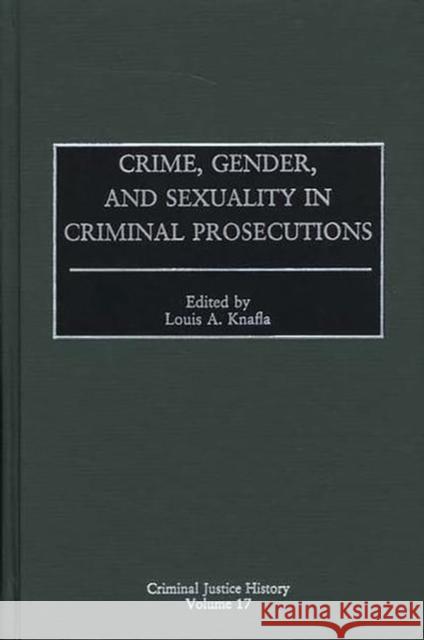Crime, Gender, and Sexuality in Criminal Prosecutions » książka
Crime, Gender, and Sexuality in Criminal Prosecutions
ISBN-13: 9780313310133 / Angielski / Twarda / 2002 / 248 str.
Knafla and his contributors explore the common problems and issues that emerge from the study of class and gender in criminal prosecutions, ranging from late medieval Europe to the early 20th century. The chapters demonstrate that conceptions of crime and criminal behavior are influenced decisively by the roles of class, gender, and later race as societies evolve in search of continuity and conformity.
The seven chapters in this volume, together with a major book review essay and critical reviews of sixteen major works in the area, reinforce the series as a major forum for exploring new directions in criminal justice research as it relates to issues and problems of class, gender, and race in their historical, criminological, legal, and social aspects. The chapters explore common themes and issues that emerge from the study of class and gender through policing and criminal prosecutions in the local community to growing attempts of the new nation state to gain control of the prosecutorial system.
Trevor Dean and Lee Beier examine prosecutorial energy in local communities of 15th and 16th century Europe, and see instruments of peace (agreement) and war (prosecution and conviction) as worthy institutions of social control. Andrea Knox studies the prosecution of Irish women, finding that they were prominent as perpetrators of crime as well as victims. Antony Simpson shows how sexual indiscretions developed the law of blackmail in the 18th century, influencing subtle changes in gender roles. David Englander's study of Henry Mayhew reinterprets the role of class in the criminal prosecutions of the 19th century, while Arvind Verma and Philippa Levine extend the roles of class and gender that had been developed in the criminal justice system into the imperial colonies of south-east and east Asia in the 19th and early 20th centuries. An important resource for scholars, students, and researchers involved with legal, political, social, and women's history, criminal justice studies, sociology and criminology, and criminal law.











